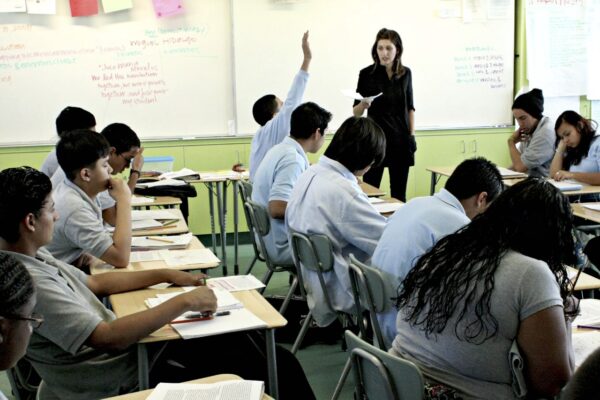
Although it was evident to me from the onset that Carlos was an English learner, as he had introduced himself to me in a thick accent, it took me a week to grasp the fact that he understood little of the goings-on in our classroom. Like many English learners, Carlos feared humiliation in the largely unforgiving atmosphere of an urban public high school. He skipped the majority of classes during the first week of school and when in class, went to great lengths to make it appear as though he understood the language being spoken around him.
In a classroom where two thirds of students are either current or reclassified English learners, many students had lived his situation. One such student was Carlos’s partner, who, sympathizing with his situation, helped him by whispering classroom directions in Spanish so that Carlos knew when to open his book, when to stand up and what to write down from the board.
The help that Carlos’s partner afforded him masked his limited fluency for the first week of school and it wasn’t until I sat with Carlos’s group the next week, as they worked on an initial project, that I understood how rehearsed his limited word exchanges with me had been.
Troubled by Carlos’s limited ability to communicate in English and his poor attendance, which I learned was the direct result of not understanding class content, I sought the help of the bilingual coordinator. She looked at his test scores and learned that he was at the early intermediate level on the California English Learner Development Test and offered to have a bilingual classroom aide work with him.
Ms. Alvarez, a former English learner and first-generation college student, joined my class the following week and worked with Carlos day-in and day-out until the end of the school year. Knowing that Ms. Alvarez was waiting for him in class each day, Carlos came regularly. Her presence assured him that he didn’t have to mask his limited English fluency and that his efforts to learn the language and content of our history class would be met with the academic support he needed. With Ms. Alvarez seated next to him, translating and helping him to complete assignments, Carlos not only attended class each day but also participated in class discussions, engaged in group work and passed the class.
On the last day of school, Carlos thanked me in the same sweet manner that he had introduced himself, but his conversation extended beyond the routine words he used on his first day. “Miss,” he said, “I appreciate what you taught me. Thank you for getting Ms. Alvarez. She helped me to learn and like American History.”
The following year, Carlos visited my classroom regularly, updating me on his senior-level classes and his progress towards graduation. Implementing the model we had developed in my class, Carlos had a bilingual tutor who supported him in each of his classes, a program that culminated in him being the first in his family to graduate from high school.
Carlos’s story highlights the importance of providing targeted support to all students and in particular, English learners. It demonstrates that when educators work together to support students with the greatest needs, it manifests in success for the individual and the community. With Carlos’s graduation, the community has an additional graduate who is proficient in English, and, like Ms. Alvarez, can become a role model for future students like himself.
Anne Busacca-Ryan is a high school teacher and Strategic Partnerships Intern at the ACLU of Southern California


